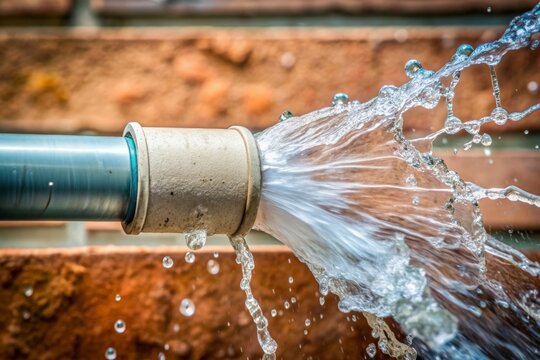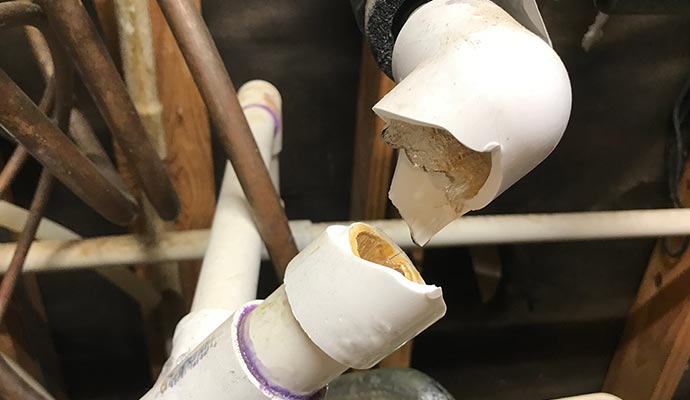Burst Pipe Insurance Claims: What You Need to Know for Water Damage Coverage
Burst Pipe Insurance Claims: What You Need to Know for Water Damage Coverage
Blog Article
Avoiding Burst Pipes: Essential Tips to Shield Your Plumbing
Avoiding ruptured pipelines is a crucial issue for house owners, particularly during colder months when the danger of freezing is heightened. Carrying out critical steps such as appropriate insulation, regular evaluations, and keeping regular interior temperature levels can significantly reduce the possibility of pipe failure. In addition, recognizing emergency situation treatments equips house owners to respond quickly to prospective plumbing issues. Nevertheless, lots of are unaware of the details vulnerabilities that their pipelines might deal with. Exploring these susceptabilities can supply invaluable insights into guarding your pipes system successfully.
Understand Pipeline Vulnerabilities
Recognizing pipe vulnerabilities is essential for efficient plumbing maintenance and protecting against pricey damages. Numerous aspects add to the vulnerability of pipelines to bursts, including product make-up, age, and environmental problems. Older pipes, specifically those made from galvanized steel or polybutylene, usually break down over time, causing increased threat of tears and leakages.
Temperature level changes can also significantly influence pipeline honesty. In chillier climates, water trapped in pipes can freeze, increasing and exerting stress on the pipeline wall surfaces, which may inevitably lead to a ruptured. Moreover, high water pressure can stress pipelines, specifically at joints and bends, heightening the probability of failing.

Insulate Pipeline Correctly
Appropriate insulation of pipes is vital for preventing freezing and subsequent bursts during cold weather (burst pipe). Insulating your pipes system effectively safeguards against temperature drops that can bring about pricey damage. Begin by determining at risk locations where pipes are exposed to exterior temperature levels, such as basements, attics, and exterior walls
Use foam pipeline insulation sleeves or wrap insulation tape around these areas to provide a safety obstacle. Ensure that all areas of the pipes, particularly those with minimal heat exposure, obtain ample insulation. Pay unique attention to fittings and joints, as these are much more susceptible to freezing.
When protecting, it's important to choose products that satisfy local building regulations and are suitable for the specific environment. For example, fiberglass insulation is commonly advised for its thermal resistance homes - burst pipe. Furthermore, consider making use of warm cables or tape in severe conditions, which can be connected in to give extra heat
Regularly inspect shielded pipelines for any kind of indications of wear or damage, as compromised insulation can diminish its performance. By taking these positive measures, you substantially decrease the risk of pipeline ruptureds, guaranteeing a trustworthy plumbing system throughout the winter season.
Maintain Consistent Temperature Level
A steady interior temperature level is vital for preventing burst pipelines during the freezing months. When temperature levels decline, water within pipes can ice up, increasing and developing stress that may inevitably create the pipes to ruptured.Utilizing a programmable thermostat can aid handle indoor temperature levels efficiently, guaranteeing that rooms with plumbing continue to be cozy even when the house is vacant.
In enhancement, it is prudent to permit taps to trickle slightly throughout extreme cold snaps. This minor flow of water can stop cold by relieving stress within the pipelines. During specifically serious weather condition occasions, consider temporarily suspending any type of nighttime problems on your thermostat to keep a consistent warm environment. By executing these approaches, home owners can considerably lower the threat of pipe ruptureds and safeguard their plumbing systems against the extreme winter aspects.
Frequently Evaluate Plumbing
Routine inspections of plumbing systems are crucial for stopping burst pipelines and maintaining general home integrity. During these inspections, it is crucial to browse around here check out noticeable pipes for indications of corrosion, leaks, or put on.
Furthermore, checking joints and links is crucial, as these points are usually prone to leaks. Homeowners need to likewise assess water stress levels, as too much stress can strain the pipes system and enhance the risk of pipeline ruptureds.
Take into consideration scheduling specialist pipes inspections at least as soon as a year, particularly you could look here prior to winter months, to ensure your system is prepared for colder temperatures. By being aggressive in your strategy, you can protect your home against the costly and disruptive effects of ruptured pipes.
Know Emergency Treatments
Understanding emergency treatments is important for each house owner, specifically after carrying out routine plumbing inspections. Being gotten ready for a pipes emergency situation can dramatically alleviate damage and save costs. Locate your main water shut-off valve; it is generally located near the water meter or where the main line enters your home. Acquaint on your own with its operation, as closing off the water system promptly can prevent extensive flooding.
Following, keep crucial devices handy. A plumbing emergency set should include a wrench, plunger, and towels, as well as a flashlight and a bucket for tiny leakages. Furthermore, think about having the get in touch with information for a trusted plumber easily offered, must the circumstance escalate beyond your control.
If you spot a leakage or ruptured pipe, quickly transform off the water supply and inform your plumbing. Record the damages with photos for insurance functions. Be conscious of the signs of possible plumbing problems, such as unusual water pressure changes or damp spots on wall surfaces
Eventually, positive understanding and swift action are crucial in handling plumbing emergency situations, guaranteeing your home continues to be safeguarded and minimizing prospective damages.

Final Thought
Finally, avoiding burst pipelines necessitates a multifaceted approach that consists of understanding pipe vulnerabilities, correct insulation, maintaining regular interior temperatures, normal assessments, and understanding of you could try this out emergency procedures. By applying these important techniques, the risk of pipes failings can be considerably lowered, thus ensuring the long life and efficiency of the pipes system. Aggressive actions not only safeguard versus prospective damages but also add to overall water preservation and the protection of property.
In cooler environments, water entraped in pipes can ice up, increasing and applying stress on the pipeline wall surfaces, which might ultimately lead to a ruptured. When temperatures drop, water within pipelines can ice up, broadening and creating stress that may eventually create the pipes to burst. By applying these strategies, homeowners can significantly minimize the danger of pipe bursts and secure their plumbing systems against the severe winter aspects.

Report this page